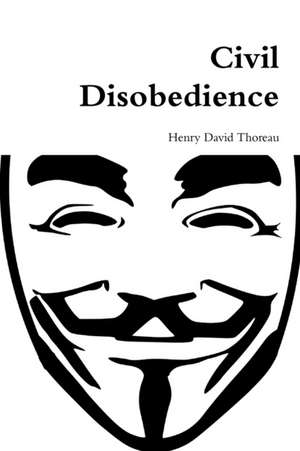Civil Disobedience
Autor Henry David Thoreauen Limba Engleză Paperback – 15 apr 2020
| Toate formatele și edițiile | Preț | Express |
|---|---|---|
| Paperback (10) | 32.18 lei 6-8 săpt. | +2.45 lei 4-10 zile |
| G&D MEDIA – 30 iul 2020 | 33.41 lei 3-5 săpt. | +2.45 lei 4-10 zile |
| CreateSpace Independent Publishing Platform – | 38.20 lei 3-5 săpt. | |
| CreateSpace Independent Publishing Platform – | 43.26 lei 3-5 săpt. | |
| EMPIRE BOOKS – 30 noi 2011 | 44.13 lei 3-5 săpt. | |
| CREATESPACE – | 61.70 lei 3-5 săpt. | |
| BROADVIEW PR – 30 noi 2016 | 121.74 lei 3-5 săpt. | +12.37 lei 4-10 zile |
| Chump Change – 3 apr 1849 | 32.18 lei 6-8 săpt. | |
| Lulu.Com – 15 apr 2020 | 34.08 lei 6-8 săpt. | |
| Lulu.Com – 25 apr 2017 | 44.75 lei 6-8 săpt. | |
| Martino Fine Books – 15 mar 2023 | 74.75 lei 38-44 zile | |
| Hardback (4) | 65.56 lei 3-5 săpt. | |
| Applewood Books – 31 aug 2000 | 65.56 lei 3-5 săpt. | |
| 12th Media Services – 23 apr 2017 | 89.80 lei 6-8 săpt. | |
| Chump Change – 21 dec 2016 | 102.13 lei 6-8 săpt. | |
| Lulu.Com – 25 apr 2017 | 139.82 lei 6-8 săpt. |
Preț: 34.08 lei
Nou
Puncte Express: 51
Preț estimativ în valută:
6.52€ • 6.78$ • 5.38£
6.52€ • 6.78$ • 5.38£
Carte tipărită la comandă
Livrare economică 15-29 aprilie
Preluare comenzi: 021 569.72.76
Specificații
ISBN-13: 9781716028632
ISBN-10: 1716028639
Pagini: 34
Dimensiuni: 152 x 229 x 3 mm
Greutate: 0.06 kg
Editura: Lulu.Com
ISBN-10: 1716028639
Pagini: 34
Dimensiuni: 152 x 229 x 3 mm
Greutate: 0.06 kg
Editura: Lulu.Com
Descriere
Descriere de la o altă ediție sau format:
Originally published in 1849 as "Resistance to Civil Government," Thoreau's classic essay on resistance to the laws and acts of government that he considered unjust was largely ignored until the Twentieth Century when Mohandas Ghandi, Martin Luther King, Jr. and anti-Vietnam War activists applied Thoreau's principles.
Textul de pe ultima copertă
Henry David Thoreau's Civil Disobedience was originally published in 1849 as Resistance to Civil Government. Thoreau wrote this classic essay to advocate public resistance to the laws and acts of government that he considered unjust. The practical application of Civil Disobedience was largely ignored until the twentieth century when, at different times, Modanda Ghandi, Martin Luther King, Jr. and anti-Vietnam War activists applied Thoreau's principles.
Notă biografică
Henry David Thoreau (July 12, 1817 - May 6, 1862) was an American naturalist, essayist, poet, and philosopher. A leading transcendentalist, he is best known for his book Walden, a reflection upon simple living in natural surroundings, and his essay "Civil Disobedience" (originally published as "Resistance to Civil Government"), an argument for disobedience to an unjust state.Thoreau's books, articles, essays, journals, and poetry amount to more than 20 volumes. Among his lasting contributions are his writings on natural history and philosophy, in which he anticipated the methods and findings of ecology and environmental history, two sources of modern-day environmentalism. His literary style interweaves close observation of nature, personal experience, pointed rhetoric, symbolic meanings, and historical lore, while displaying a poetic sensibility, philosophical austerity, and attention to practical detail.[5] He was also deeply interested in the idea of survival in the face of hostile elements, historical change, and natural decay; at the same time he advocated abandoning waste and illusion in order to discover life's true essential needs.Thoreau was a lifelong abolitionist, delivering lectures that attacked the fugitive slave law while praising the writings of Wendell Phillips and defending the abolitionist John Brown. Thoreau's philosophy of civil disobedience later influenced the political thoughts and actions of such notable figures as Leo Tolstoy, Mahatma Gandhi, and Martin Luther King Jr.
